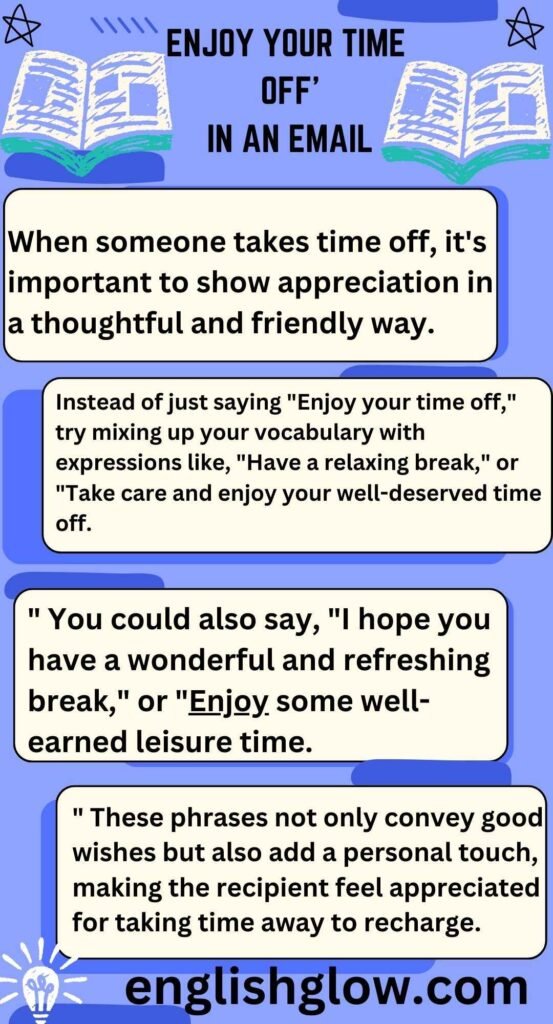When crafting emails to wish someone well-wishes during their time off, the phrase you choose can significantly impact the sentiment conveyed. It’s not just about using different words; it’s about tailoring the message to personalize the experience for the recipient. A thoughtful communication style not only shows respect but can also make your correspondence feel more engaging and supportive.
Diversified expressions allow you to enhance the effectiveness of your encouragement, ensuring that it resonates more deeply. For example, instead of the standard “enjoy your downtime,” consider saying “I hope you encourage yourself to truly unplug and relax.” This not only broadens the alternative ways to convey this common sentiment, but also adds a positive and personalized touch, reflecting sincerity in your wishes. Another expression could be, “May your time off refresh and rejuvenate you,” which offers a reflective and caring perspective, showing that you value their well-being.
Throughout my career, I’ve seen how small changes in wording can transform the tone of professional interactions. By choosing words that are varied and thoughtfully aligned with the person’s situation, the simple act of sending an email becomes a genuine gesture of kindness and professionalism. This approach not only shows your ability to be personalize and supportive, but it also sets a standard for respectful and effective communication within any professional setting.
List of Other Ways to Say “Enjoy Your Time Off” in an Email
When someone takes time off, it’s important to show appreciation in a thoughtful and friendly way. Instead of just saying “Enjoy your time off,” try mixing up your vocabulary with expressions like, “Have a relaxing break,” or “Take care and enjoy your well-deserved time off.” You could also say, “I hope you have a wonderful and refreshing break,” or “Enjoy some well-earned leisure time.” These phrases not only convey good wishes but also add a personal touch, making the recipient feel appreciated for taking time away to recharge.
Is It Professional to Say “Enjoy Your Time Off”?
In the realm of professional communication, using the phrase “Enjoy your time off” is not only appropriate but can also signify a genuine understanding and well-wishes for a coworker’s holiday or vacation. This expression fosters a courteous and supportive work environment, acknowledging the employees’ need to enjoy their leave. Such a sentiment in email correspondence strengthens rapport and shows versatility in interactions, making it a positive and formal closure to communication before someone takes time off.
You might enjoy reading: How To Write A Thanks for Warm Welcome Email Reply
What to Say Instead of “Enjoy Your Time Off”
When a colleague is about to take a break, it’s thoughtful to use expressions that go beyond the typical “Enjoy your time off.” Saying “Have a fantastic getaway” or “Wishing you a delightful vacation filled with relaxation” can personalize your well-wishes and reflect a more engaging and considerate approach within the workplace. These phrases showcase a deeper sentiment and appreciation for their need to rejuvenate and enjoy their time away.
Alternatively, you might opt for “May your leave be as amazing and enjoyable as you hoped,” or “Here’s to a truly splendid and rejuvenating break!” Such varied options not only convey your best wishes in a courteous and professional manner but also enhance the diversity of formal and informal interactions. These alternative ways to express your intentions are more than just a gesture; they encourage a culture of genuine appreciation and support.
Is It Professional to Say “Enjoy Your Time Off”?
In the realm of professional communication, extending well-wishes for a vacation or holiday should blend courtesy with genuine sentiment, whether the setting is formal or informal. Using the phrase “Enjoy your time off” is perfectly acceptable, but let’s consider more versatile options that might resonate more closely with the subject or project your colleague or coworker is transitioning from. For instance, if John is finishing a major milestone, a message like, “Congratulations on completing the project, John! Enjoy a well-deserved break,” adds a personal touch and acknowledges his efforts more directly.
Another aspect to consider is how these interactions can enhance workplace communications and strengthen rapport. Instead of sticking to a generic script, tailoring your language, such as saying, “Hope your time away recharges you for our exciting upcoming ventures, Devon,” makes the bid for closure before a schedule break feel more thoughtful and caring. This approach not only reflects positive intentions but also shows an understanding of your colleague’s work and personal needs, which can be crucial for maintaining a healthy professional environment and encouraging pros of open, supportive dialogue without the drawbacks of feeling too generic.
What to Say Instead of “Enjoy Your Time Off”
When it’s time to craft a message for a colleague heading out on vacation, consider alternatives to the usual “Enjoy your time off” that might bring more joy and delight to their getaway. Expressions like “Hope your break is as fantastic as you are!” or “Wishing you a splendid vacation filled with relaxation and fun,” can make your goodbyes warmer and more personal. For those who’ve been particularly stressed, “May your time away be rejuvenating and enjoyable,” acknowledges their hard work and the well-deserved rest they’re about to embrace.
Embrace your break:
In the workplace, when someone is about to take some time off, a warm and encouraging note can make all the difference. Saying “Thank you for clarifying, now make sure to embrace your break and immerse yourself in relaxation,” combines gratitude with a nudge towards taking real time off. This approach not only acknowledges the importance of the recipient’s recent contributions but also emphasizes the need for rejuvenation and openness to relaxation. It’s a thoughtful way to signal that you value their well-being as much as their hard work, encouraging them to disconnect fully and recharge.
Make the most of your time away:
When acknowledging someone’s efforts in clarifying a point via email, you might extend the conversation to their upcoming break. A thoughtful phrase like “Thank you for clarifying, and now make the most of your time away by engaging in fulfilling activities that create lasting memories,” can resonate deeply. This not only appreciates their help but also emphasizes the opportunity they have to rejuvenate during their time away. It’s a way to encourage them to disconnect from work and enjoy their break to the fullest, potentially returning with new energy and insights.
Wishing you a delightful vacation:
After clarifying a key point in an email, it’s a thoughtful gesture to transition into well-wishes for the recipient’s upcoming time away. A fitting phrase could be, “Thank you for clarifying, and I sincerely wish you a delightful vacation.” This shows that you value not only the information shared but also their overall well-being and happiness. It expresses a hope that their break brings joy, pleasure, and satisfaction, emphasizing that you care about their experience during their time away. Such personalized sentiments strengthen relationships and foster a supportive atmosphere.
May your holiday be filled with joy:
When expressing thanks for a clarification, it’s also thoughtful to include well-wishes for the upcoming holiday. A heartfelt phrase like “Thank you for clarifying that point; may your holiday be filled with joy,” directly emphasizes your desire for the recipient to have a positive, uplifting experience. This not only acknowledges their helpfulness but also focuses on fostering joyful emotions during their break. Such expressions deepen the connection between colleagues and ensure that your gratitude leaves a lasting, encouraging impact.
Enjoy a fantastic getaway:
After someone helps by describing something clearly, it’s a nice touch to acknowledge their effort as they head into a break. “Thank you for clarifying that for me; I wish you a fantastic getaway filled with excitement and memorable moments.” This statement not only shows appreciation for their assistance but also conveys a genuine wish for the recipient to have an extraordinary and memorable time. It’s a way to connect on a personal level, recognizing their need for rest and adventure.
You might enjoy reading: 10 Other Ways to Say “I Hope You Had a Great Weekend” in an Email
Have an amazing time off:
When you respond to someone who has made things clearer, it’s a great opportunity to extend good wishes for their upcoming break. Saying “Thank you for clarifying that; I’m wishing you an amazing time off” not only expresses your appreciation but also your desire for their experience to be filled with enjoyment and to be truly extraordinary..
In conclusion
When someone clarifies a point that enhances your understanding, responding with gratitude can also be a chance to wish them well for any upcoming time off. A phrase like “Thank you for clarifying that; I hope you enjoy your time away” not only serves as a polite gesture but also sets a tone of empathy and support. Incorporating these feelings into your emails adds a personal touch that is often appreciated and valued by colleagues, making them feel supported and valued.
Choosing your words carefully can transform a simple thank-you into something more meaningful. Saying “Have an extra pleasant time off” after a thank-you can enhance the message with a heartfelt expression of good wishes. These alternatives demonstrate not just professional courtesy but a deeper level of personal care and respect, encouraging a more connected and caring workplace environment.






